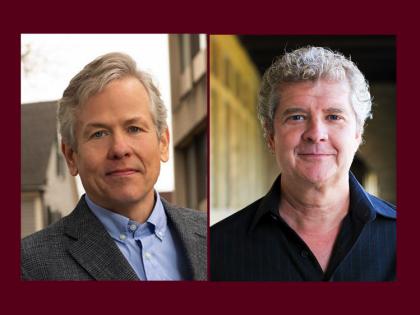Scott Miller ’86, the founder and artistic director of New Line Theatre in St. Louis, celebrates the innovation and adventurousness of musicals in his Strike Up the Band: A New History of Musical Theatre (Heinemann, $23.95, paper). He pays close attention to 150 shows in the past century and gives very high marks to West Side Story. Its music, of course, is by the late Leonard Bernstein ’39, D.Mus. ’67, once called “music’s most exuberant hero” (see “Maestro Lenny,” September-October 2006, page 29).

Image courtesy of the Harvard Theatre Collection
Fifty, and still a heartbreaker
Opening on Broadway September 26, 1957, West Side Story was the next Great American Musical, and one of the American theatre’s few great tragedies, appearing just when American cinema and theatre were discovering social-problem stories, just when America was beginning to reengage with its greatest evils. West Side Story told a story about hatred and prejudice in which a happy ending is not possible, in which love cannot triumph over all. The story went miles beyond its source material, Shakespeare’s Romeo and Juliet. When director-choreographer Jerome Robbins, composer Leonard Bernstein, and bookwriter Arthur Laurents first discussed this story (lyricist Stephen Sondheim wouldn’t be joining them until later), it focused on tensions between Catholics and Jews and it was called East Side Story. That this group of rich, white, Jewish, gay men eventually changed the focus to Anglo-Americans and Puerto Rican Americans, that the team recognized the profound racial prejudice in America (and especially New York) against Latinos may excuse the awkwardness and minimal, unintentional racism in their final product.…
[T]o its credit, strictly as a work of art and ignoring its flaws as a social document, West Side Story is certainly a perfect blend of the many disciplines that make musical theatre; more than most musicals, the book, music, lyrics, and staging come together as a perfectly unified whole, speaking with one voice. Musical theatre is by its nature a collaborative art form but rarely do the many parts make such a consistently crafted statement. Driven by the vision of the often tyrannical Jerome Robbins, the greatest talents on Broadway created a musical that is specific yet universal (as Robbins would do again with Fiddler on the Roof), a show as current as today’s headlines yet also timeless. It is a Broadway fable whose final curtain brings not hope for tomorrow but inconsolable grief over today; what little hope the final moments may imply, we still know that hatred does not die. In a country where hate crimes multiply exponentially each year and gang warfare has turned our urban streets into war zones, West Side Story is still heartbreaking and also deeply cathartic.
There’s an argument to be made that West Side Story is actually a better piece of drama than Romeo and Juliet.…Plotwise, West Side Story is simply more dramatic, more romantic, more tragic, more suspenseful, more resonant, and more emotional.







